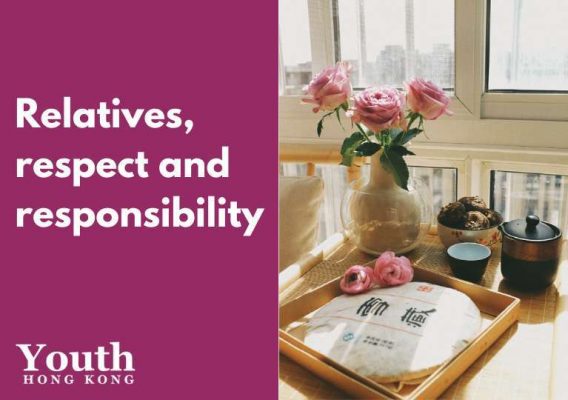//vol.14-1 Perspectives
- Jenny Liu and Ronald Chan have participated in various HKFYG projects concerning the ageing population.
- Both see that the burden of supporting both the older and the younger generations will fall on the shoulders of today’s working adults
- They reflect on the ways in which population trends have affected their own decision-making since neither of them are sure about having children
- Jenny和 Ronald積極參與青協活動,一直關注人口老化議題。
- 他們留意到,現今的上班族都肩負著照顧年輕一代和老年一代的雙重擔子。
- 目前的人口趨勢影響了他們的決定,也讓他們未能明確決定將來會否生兒育女。
 Reflections on getting old
Reflections on getting old
An essay by Jenny Liu
Personally, although I am already in my 30s, I am not sure about having children. As I grow older and reflect more on the elderly, I feel the responsibility that goes with saving more and helping to take care of younger and older relatives.
Nonetheless, trends in our ageing society show that the older generation can be highly productive as well as being good advisors for young people. Meanwhile, some Hong Kong couples who are cautious about having children are opting for pets instead or emigrating for better educational opportunities, less academic pressure and a more liberally-minded society.
While it is conventional for Hong Kong people to make their own retirement plans, I think the government can do more, taking on 30% of the financial responsibility perhaps. Otherwise, the younger generation’s burden will be too heavy and their resources too stretched. The government should also invest more in elderly medical care with tailor-made hospital services, access to which is otherwise difficult for individuals. There are both public and private sector retirement homes now with a public high-end pilot silver care development in North Point.
If you listen … you can learn how to be more patient and well-prepared for ageing yourself.
If my parents needed it, I would pay for a professional carer to take care of them and when possible, I would move to a bigger apartment and invite them to stay over sometimes, or travel with me every few years and enjoy some quality family time together. By observing and taking care of our own relatives and parents, it becomes easier to imagine life as an older person. The environment we grew up in was so different. With empathy, it is possible to discover the reasons behind our differences. If you listen and try to understand, you can learn how to be more accommodating, patient and well-prepared for ageing yourself.
For ageing at home, I think there is greater potential for elderly friendly elements in household design, such as hand rails, anti-slip surfaces in bathrooms and height-adjustable furniture. More videos or apps should also be developed by entrepreneurs, such as easy chat functions, online game with bigger fonts, mahjong games targeting the silver market and special karaoke. All these could enhance the quality of life for the elderly and give them social outlets to share.
 An irreversible fact
An irreversible fact
An essay by Ronald Chan
In general, local youngsters are respectful towards the elderly and are willing to contribute to their wellbeing. However, the burden is ever-increasing as large families with many siblings become a rarity. In the old days, multiple breadwinners supported their parents. Soon, both parents will be looked after by an only child who will possibly support both grandparents as well.
The projected proportion of people aged above 65 by 2041 is 30% and this estimate does not factor in the recent decrease in the local birth rate. Unfortunately, the ageing of society is an irreversible fact both in Hong Kong and in most developed societies. This will only aggravate intrinsic intergenerational tensions caused by differing values, driving the birth rate even lower. Personally, I would prefer to pay professional carers or domestic helpers to look after a dependent family member if I could afford it. It would be more efficient. There is no substitute for personal involvement but there are many ways to show you love and care for your relatives.
In future, the elderly cohort will be better educated and will retire later than today. Their needs will open up new markets in medical care, daily living support, transport, even catering and entertainment so they can live “younger lives” in their early senior years. However, social disparities will still emerge and many will need substantial support from their families and the government. Government should strengthen support that is difficult to provide at home but programmes should support ageing at home, home modification services, visits and meal deliveries, support for public transport and community care.
Therefore, it is important for today’s working population to prepare well and save up for their own retirement. Strong incentives should be provided to those who support older family members. Personally, although I am married and hope to have children one day, I have no solid plans. I will probably work till my 70s and I know I need to prepare now if I am to have a more decent life later. It will be a long time before something like a government insurance scheme with voluntary contributions materializes. It is easier to convince people to save while the government covers basic needs.
Services that allow easy online video calls, particularly in pandemic times when family gatherings are not easy, if not illegal, should be a basic right. After all, most elderly people will not need or enjoy the latest technologies but they do need the right technology to be easy and convenient. You only have to be a frequent visitor to your grandparents to see that. It also gives you the added bonus of making them happy to see you! ![]()
As well as the essays here, both Jenny Liu and Ronald Chan contributed to a survey conducted in 2015 by the HKFYG Youth IDEAS Society & Livelihood group.
Read at yrc.hkfyg.org.hk/2015/08/27/yi002/
A summary can be found in Youth Hong Kong.
Read on page 48 at youthhongkong.hkfyg.org.hk/journal.php?jid=29&p=48
Jenny also contributed to a forum discussion about intergenerational justice published in the June 2016 issue of Youth Hong Kong.


